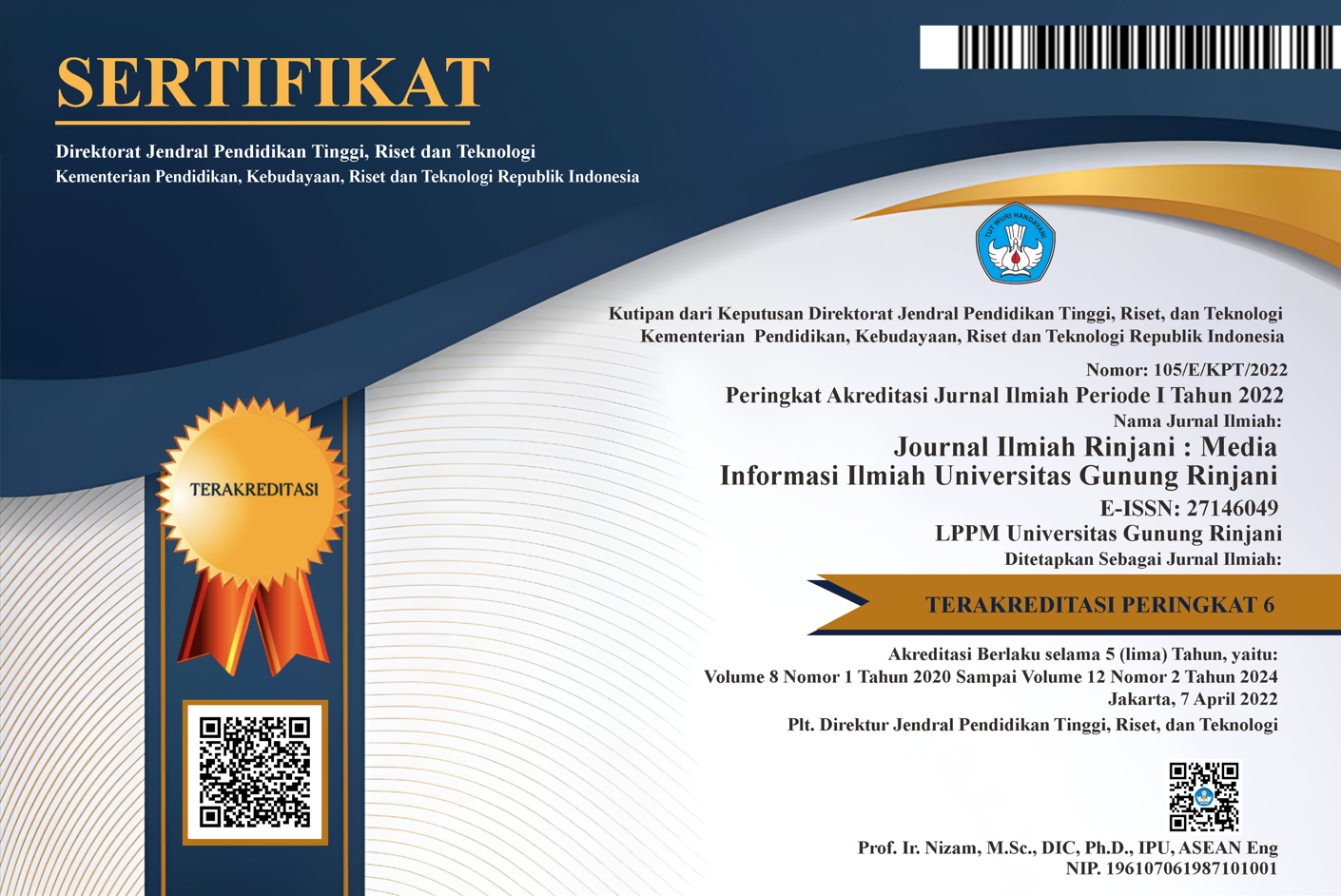Waste Management Through The Reduce, Reuse And Recycle Approach At Gunung Sari Market West Lombok District
Keywords:
Keywords: Waste Management, Reduce, Reuse and Recycle Approach.Abstract
Waste management at Gunung Sari Market is a very important requirement for the cleanliness of Gunung Sari Market itself. In facing current challenges, the existence of a clean environment and increasingly stringent regulations from the Government, the Gunung Sari market needs to have a good waste management pattern based on waste generation and composition. The aim of this research is to find out how waste is managed at Gunung Sari Market, West Lombok. This research method is descriptive qualitative with data collection tools namely observation, interviews, surveys. The results of this research show that waste management at Gunung Sari Market using the 3R Approach (Reduce, Reuse, Recycle) with grouping based on the type of waste, can reduce waste generation and optimize the use of resources, through reducing waste at the source, reusing materials that can be recycled recycling, and efficient recycling processes, thereby reducing environmental impacts and generating sustainable economic benefits. Management of the Gunung Sari Market using the 3R approach must start with waste containerization, this must be provided by the Gunung Sari Market Management, namely 3 liters, placed in each aisle and the type of waste differentiated namely organic and inorganic waste. With a volume of organic waste of 11.2 L/day with a composted waste capacity of 8.8 L/day, the number of composter drums that must be prepared is 4. Meanwhile, waste residue has a volume of 3 L/day with a storage capacity of 21 liters with an organic waste storage area of 2 m3 with a length of 2 m, a width of 1 m and a height of 1 m. The suggestion in this research is that it is hoped that future researchers will carry out waste container planning to make it easier to calculate the amount of each waste source so that waste management using the 3 R's can be easily carried out.
Keywords: Waste Management, Reduce, Reuse and Recycle Approach.
Downloads
References
Afriandi, M. N., Harahap, R., & Sarifah, J. (2020). Optimalisasi Pengelolaan Sampah Berdasarkan Timbulan dan Karakteristik Sampah Di Kelurahan Gedung Johor Kecamatan Medan Johor Kota Medan. Buletin Utama Teknik, 15(3), 28.
Agung, K., E. Juita, dan E. Zuriyani. 2021. Analsis Pengelolaan Sampah di Tempat Pembuangan Akhir (TPA) Desa Sido Makmur Kecamatan Sipora Utara. JPIS (Jurnal Pendidikan dan Ilmu Geografi). 6(2): 115-124.
Aliyah, I. (2017). Pemahaman konseptual pasar tradisional di perkotaan. Cakra Wisata, 18(2).
Aliyah, I. (2014). Penguatan Sinergi Antara Pasar Tradisional Dan Modern Dalam Rangka Mewujudkan Pemerataan Pembangunan Ekonomi Kerakyatan. Jurnal Arsitektur, 4(2).
Hardiatmi S. (2011) Pendukung Keberhasilan Pengelolaan Sampah Kota. INNOFARM. Jurnal Inovasi Pertanian, 10 (1): 50-66
Ir Rahidun Simangunsong, M., & Sitohang, I. R. (2020). Kajian Sistem Pengelolaan Sampah dengan konsep Reduce-Reuse-Recycle (3R) Studi kasus Kelurahan Sei Kambing C II, Kecamatan Medan Helvetia. Jurnal Sains dan Teknologi ISTP, 13(1), 31-38.
Kusmawati, F. (1996). Pola Hari Pasar di Kabupaten Gunungkidul. Yogyakarta: Universitas Gadjah Mada.
Mulasari, S. A. (2012). Hubungan tingkat pengetahuan dan sikap terhadap perilaku masyarakat dalam mengelola sampah di dusun padukuhan desa sidokarto kecamatan godean kabupaten sleman yogyakarta. Jurnal Kesmas volume 6 nomor 3: 204-211
Meri, L. Iziddin, F, Elmiyati, Siti. A. B. 2020. Pengelolaan Sampah Dengan Konsep 3R Dalam Mengurangi Limbah Rumah Tangga. Jurnal Abdimas UNAYA. ISSN 2474-1845. Vol. 1. No. 1. 41-47
Ojewale, O.S. 2014. Intaurban Analysis Of Domestic Solid Waste Disposal Methods in a Sub- Shara African City. Jurnal of Waste Management. 193469.
Regina, A.A. 2020. Penerapan Prinsip 3R (Reduce, Reuse, Recycle) Dalam Pengelolaan Sampah Di Restoran Cepat Saji KFC Yogyakarta Dalam Ea Go-Food. Universitas Atma Jaya Yogyakarta.
SNI 19-2454-2002 (2002). Tata Cara Operasional Pengelolaan Sampah Perkotaan. Badan Standarisasi Nasional.
SNI 19-3694-1994 (1994). Metode Pengambilan dan Pengukuran Contoh Timbulan dan Komposisi Sampah Perkotaan. Badan Standarisasi Nasional.
SNI 19-3983-1995. Judul Standar, Spesifikasi timbulan sampah untuk kota kecil dan kota sedang di Indonesia
Sejati, K. (2009). Pengolahan Sampah Terpadu. Edisi Pertama. Diedit oleh P. Penta. Yogyakarta: Kanisius.
Sitohang, I. R. (2020). Kajian Sistem Pengelolaan Sampah Dengan Konsep Reduce-Reuse- Recycle (3R) Studi kasus Kelurahan Sei Kambing C II, Kecamatan Medan Helvetia. Jurnal Sains dan Teknologi ISTP, 13(1), 31-38
Permendagri. (2007). Peraturan Menteri Dalam Negeri No 42 Tahun 2007 tentang Pasar Desa. Jakarta: Menteri Dalam Negeri RI
Peraturan Menteri Pekerjaan Umum Nomor: 03/PRT/M/2013 Tentang Penyelenggaraan Prasarana dan Sarana Persampahan Dalam Penanganan Sampah Rumah Tangga Dan Sampah Sejenis Sampah Rumah Tangga.
Undang-Undang Nomor 18 Tahun 2008 tentang Pengelolaan Sampah. (2008).
Riayani, B.dkk (2023). Optimalisasi pengeolahan Sampah Rumah Tangga Dengan Menggunakan Metode 3R Di Dusun Wanasari Desa Dauh Puri Kaja, Kecamatan Denpasar Utara, Kota Denpasar. Jurnal Abdimas Multidisiplin. E-ISSN 2963-0770 Vol.2, No. 2.












